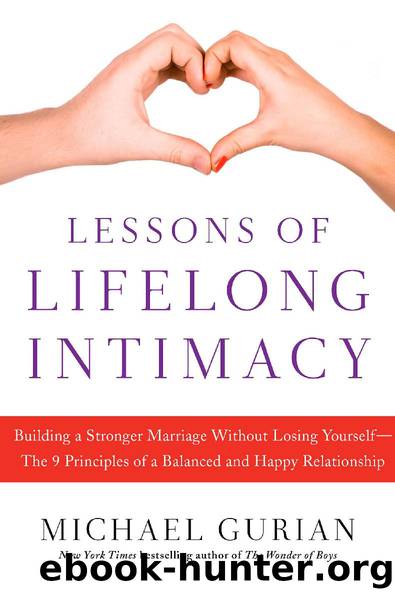Lessons of Lifelong Intimacy by Michael Gurian

Author:Michael Gurian
Language: eng
Format: epub
Publisher: Atria Books
Genome Mapping (Official and Non-Official)
Constant anger and constant rumination are, as we’ve noted throughout this book, powerful enemies of marital tranquillity. A tool to help you look at both anger and rumination has emerged in this last decade and will solidify even more fully in the next decades: genome/DNA mapping. Genome mapping is becoming less expensive every day, and more and more people are utilizing it to gauge susceptibility to physical and health issues; it is not yet a perfect mechanism for pinpointing the brain’s functions, but it will most likely advance to this goal at some point.
Until genome mapping fully reflects the brain as much as it now does the body, and bloodstream, you can do some of the psychological mapping yourself, realizing from genome research that many of your own, natural marriage-stressing qualities (and your partner’s) are inborn. These realizations can help you end power struggle because they can assist you in self-regulating aggression, anger, rumination, and anxiety.
Here is an example you can track right now through your own observations of yourself and your partner: the alleles on your 5-HTT gene, which regulate serotonin in your brain. Studies by Emory University primatologists J. D. Higley, Steve Suomi, and their team were some of the first to qualitatively identify the 5-HTT alleles. They and other geneticists over the last two decades have found that:
1. Short alleles on the 5-HTT gene tend to make naturally aggressive people even more aggressive.
2. Short alleles on the 5-HTT gene tend to make people who are inclined toward anxiety even more inclined to dwell on things, both naturally and/or under stress.
So, if you are the “aggressive” person or the “anxious” person, you are most likely “wired” that way. Researchers have further found differences between people with two short alleles, one long and one short allele, and two long alleles. The exact number of people with these three distinct allele sets is unknown—it can’t be measured until absolutely everyone on earth has a genome map done—but researchers estimate around 17 percent of people have two short alleles. These people can tend to be more anxious or aggressive than those with two long alleles. A 2013 study found that approximately 70 percent of people would qualify as “less sensitive” on a spectrum of “naturally resilient, relatively nonreactive to aggressive emotions,” but that the remaining 30 percent would qualify as “sensitive or very sensitive.” Of this 30 percent, a little over half are likely to have two short alleles and slightly less than half have one short and one long allele on the 5-HTT chromosome.
In your marriage, you may fit one of these categories, as may your partner. Perhaps you have two short alleles or one short and one long, and fit on the “more sensitive” end of the spectrum (like Andy), but you are married to someone who has two long alleles, so he or she is relatively unconscious of the damage that can be done with aggressive and insensitive words or tones of voice (perhaps like Toni).
Download
This site does not store any files on its server. We only index and link to content provided by other sites. Please contact the content providers to delete copyright contents if any and email us, we'll remove relevant links or contents immediately.
| Codependency | Conflict Management |
| Dating | Divorce |
| Friendship | Interpersonal Relations |
| Love & Loss | Love & Romance |
| Marriage | Mate Seeking |
Doing It: Let's Talk About Sex... by Hannah Witton(8558)
The 5 Love Languages: The Secret to Love That Lasts by Gary Chapman(8521)
Should I Stay or Should I Go? by Ramani Durvasula(6796)
The Road Less Traveled by M. Scott Peck(6646)
The Lost Art of Listening by Michael P. Nichols(6481)
Daring Greatly by Brene Brown(5648)
We Need to Talk by Celeste Headlee(4879)
Beartown by Fredrik Backman(4429)
Men In Love by Nancy Friday(4337)
The State of Affairs by Esther Perel(3941)
The Rules Do Not Apply by Ariel Levy(3912)
How To Win Friends and Influence People by Dale Carnegie(3778)
Reflections Of A Man by Mr. Amari Soul(3706)
The Ethical Slut by Janet W. Hardy(3509)
Algedonic by r.h. Sin(3507)
Pillow Thoughts by Courtney Peppernell(3411)
Finding My Forever by Heidi McLaughlin(3311)
He's Just Not That Into You by Greg Behrendt & Liz Tuccillo(3307)
I Love You But I Don't Trust You by Mira Kirshenbaum(3233)
